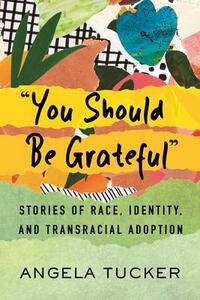You need to sign in or sign up before continuing.
Take a photo of a barcode or cover
133 reviews for:
You Should Be Grateful: Stories of Race, Identity, and Transracial Adoption
Angela Tucker
133 reviews for:
You Should Be Grateful: Stories of Race, Identity, and Transracial Adoption
Angela Tucker
emotional
informative
reflective
medium-paced
Moderate: Racism, Death of parent
informative
reflective
medium-paced
emotional
informative
medium-paced
Minor: Drug use, Mental illness, Racism
Really wanted to like this book because I have listened to some of Angela Tucker's other work and enjoyed it. I just wasn't really compelled by this book unfortunately.
challenging
emotional
funny
hopeful
informative
inspiring
fast-paced
Brings up a lot of good topics/concepts, however I feel like this is more beginning/introductory reading and wasn’t giving me any information I didn’t already know.
challenging
emotional
funny
hopeful
informative
inspiring
reflective
sad
tense
fast-paced
Graphic: Ableism, Cancer, Abandonment
As a transracial adoptee myself, I had a lot of conflicting feelings while reading this book, which led me to eventually decided to DNF at 73%. I agree with a lot of what Angela Tucker shared about the current state of transracial adoption. I really appreciated the moments that she supported her claims with statistics, scientific papers, and personal accounts from other transracial adoptees. The fact that she also worked as a caseworker at an adoption agency added credence to her words. The personal details she shared about her journey to reconnect with her birth parents was also quite compelling. However, I had a lot of issues with the way Tucker makes grand generalizations and pathologizes both adoptees and their birth parents.
Is this book a memoir or a scientific book on transracial adoption? I say it's a sloppy attempt at both. Throughout the book, Tucker recounts interactions she has had while mentoring teenaged transracial adoptees. In these instances, Tucker presents herself as the expert who knows how the child feels. Her observations are often paired with statements that suggest adoptees are forever wounded or have deluded themselves into a false sense of security. The problem is Tucker not have the proper scientific backgound to make these claims. On what authority does Tucker have to state that a young black transracial adoptee's statement that he is proud to be an "Oreo" and likes defying the expectation that he must like basketball (he is a musical theater nerd instead) indicates his "forced assimilation?" Did she conduct a previous study that draws this correlation? Where's the evidence? In my opinion, the acceptance or use of such terms to describe oneself is not same as assimilation. It is much more complicated than that for transracial adoptees.
I have no problem with Tucker describing her own feelings about transracial adoption. But I draw the line when she speaks for other adoptees. I draw the line when her examples of other transracial adoptees collectively suggest that all adoptees are inherently wounded. That they all have an inherent affinity with their birth culture. That they all feel lost and insecure. To me, these sort of generalizations always seem to carry the horrible implication that if you're an adoptee and don't feel this way (i.e. if you're proud of your difference, of having your feet in two different cultures), you're kidding yourself. You've been brainwashed. You're just refusing to face the trauma of adoption. IT IS NOT THAT SIMPLE.
Even though Tucker at times acknowledges that her own adoptive parents avoided many of the pitfalls of transracial adoption, the book as a whole portrays adoptees as individuals who are always out of place, always searching for themselves, always in need of a biological connection. In this regard, I fear that a lot of uninformed readers will see the book as representative of the experience of all transracial adoptees. They won't think that more nuance is needed or consider possible counterarguments. They'll see the book as fact, mainly because it mostly confirms stereotypical notions about the mental state of adoptees.
Perhaps many adoptees agree with Tucker, but I for one am so so tired of media that perpetuates a single story of adoption, which is usually that adoption is trauma and nothing else. I repeat: IT IS NOT THAT SIMPLE. If there is anything I've learned from being an adoped is that every adoptee thinks and feels differently about their adoption. So please, even if you are an adoptee yourself, don't speak for all of us. I welcome your story, but please leave room for others to share theirs that might completely differ or even conflict with yours.
Is this book a memoir or a scientific book on transracial adoption? I say it's a sloppy attempt at both. Throughout the book, Tucker recounts interactions she has had while mentoring teenaged transracial adoptees. In these instances, Tucker presents herself as the expert who knows how the child feels. Her observations are often paired with statements that suggest adoptees are forever wounded or have deluded themselves into a false sense of security. The problem is Tucker not have the proper scientific backgound to make these claims. On what authority does Tucker have to state that a young black transracial adoptee's statement that he is proud to be an "Oreo" and likes defying the expectation that he must like basketball (he is a musical theater nerd instead) indicates his "forced assimilation?" Did she conduct a previous study that draws this correlation? Where's the evidence? In my opinion, the acceptance or use of such terms to describe oneself is not same as assimilation. It is much more complicated than that for transracial adoptees.
I have no problem with Tucker describing her own feelings about transracial adoption. But I draw the line when she speaks for other adoptees. I draw the line when her examples of other transracial adoptees collectively suggest that all adoptees are inherently wounded. That they all have an inherent affinity with their birth culture. That they all feel lost and insecure. To me, these sort of generalizations always seem to carry the horrible implication that if you're an adoptee and don't feel this way (i.e. if you're proud of your difference, of having your feet in two different cultures), you're kidding yourself. You've been brainwashed. You're just refusing to face the trauma of adoption. IT IS NOT THAT SIMPLE.
Even though Tucker at times acknowledges that her own adoptive parents avoided many of the pitfalls of transracial adoption, the book as a whole portrays adoptees as individuals who are always out of place, always searching for themselves, always in need of a biological connection. In this regard, I fear that a lot of uninformed readers will see the book as representative of the experience of all transracial adoptees. They won't think that more nuance is needed or consider possible counterarguments. They'll see the book as fact, mainly because it mostly confirms stereotypical notions about the mental state of adoptees.
Perhaps many adoptees agree with Tucker, but I for one am so so tired of media that perpetuates a single story of adoption, which is usually that adoption is trauma and nothing else. I repeat: IT IS NOT THAT SIMPLE. If there is anything I've learned from being an adoped is that every adoptee thinks and feels differently about their adoption. So please, even if you are an adoptee yourself, don't speak for all of us. I welcome your story, but please leave room for others to share theirs that might completely differ or even conflict with yours.
informative
reflective
medium-paced
informative
reflective
medium-paced





